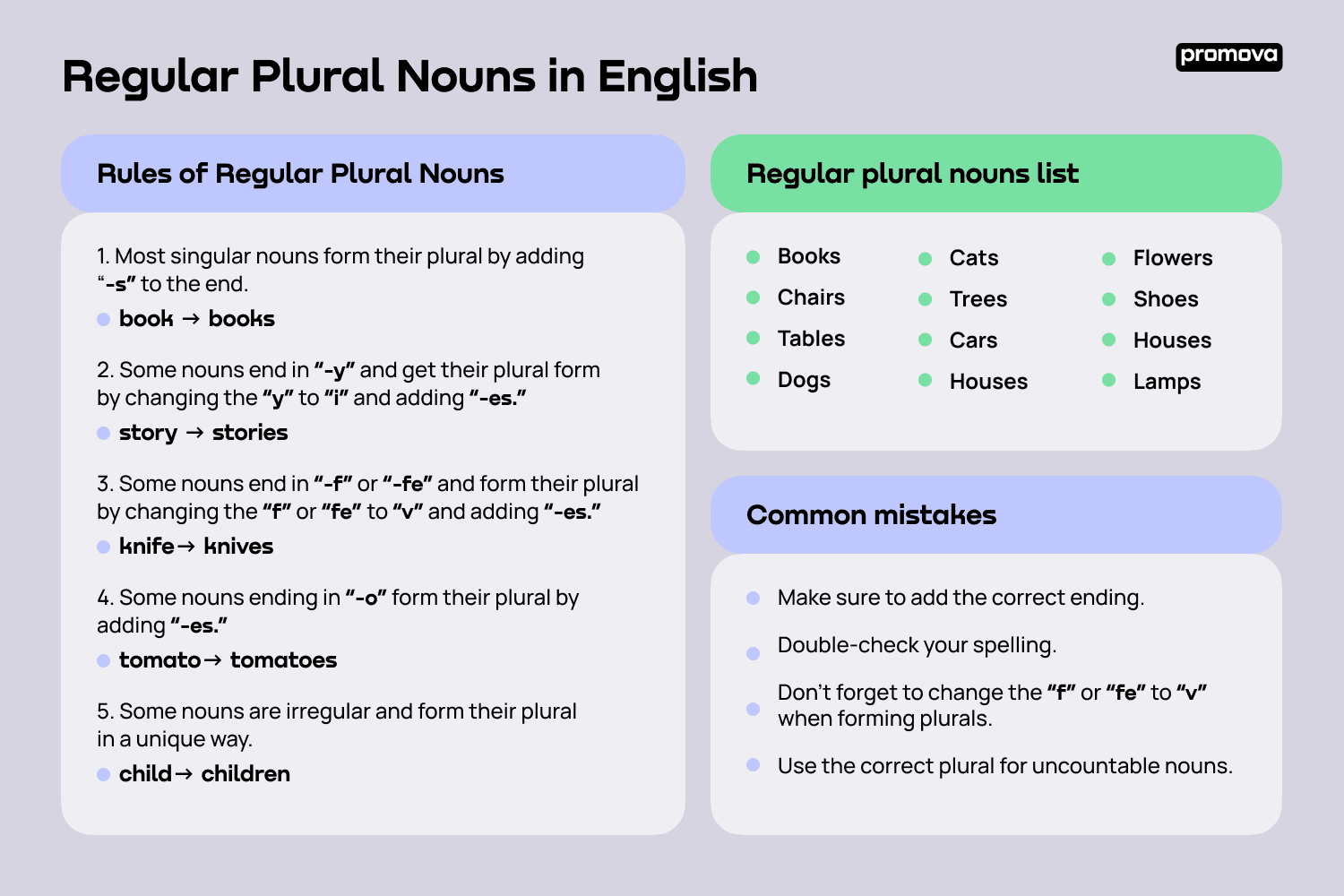Regular Plural Nouns in English
Contents
Knowing the plural forms of different nouns is important if you want to speak English fluently. But what exactly are they? How can you recognize them? What are some tips to help you use them correctly? In this guide, we'll answer these questions and discuss regular plural nouns in English.
What is a Regular Plural Noun?
Let's start from the very beginning. What is a noun in general? It is a word other than a pronoun that identifies any class of people, places, things, or concepts. Nouns can be either singular or plural. What's the difference? You use a singular noun if you have one of something; if more than one – plural.
There are two types of plural nouns: regular and irregular. Today, we're focusing on regular plurals. In English, these nouns follow standard forms of pluralization, typically by adding -s or -es to the end of the singular form (book – books, cat – cats, letter – letters, etc.). The patterns they follow are predictable, and they apply to most nouns in English.
Regular plural nouns are also divided into two categories:
- Countable nouns – represent things that you can count, such as "books," "chairs," or "tables." In this case, you can tell how many things are there.
- Uncountable nouns – refer to things that cannot be counted, such as "happiness" (there is no such thing as happinesses) or "love" (not loves).
So, what is a regular plural noun? Now that you know the answer, we can dive into the rules and nuances of this topic.
Rules for Forming Regular Plural Nouns
The way you form a regular plural form of a noun mostly depends on the ending of the singular form of the word. Here are some common regular plural nouns examples and the rules applied to forming them:
- Add -s for most regular plural nouns.
book → books;
dog → dogs;
room → rooms.
- Add -es for nouns that end in -s, -sh, -ch, -x, or -z.
bus → buses;
church → churches;
box → boxes;
blush → blushes.
- Change "y" to "i" and add -es for nouns ending in a consonant + y.
story → stories;
baby → babies;
city → cities;
- Add -s for vowels + y.
key → keys;
play → plays;
toy → toys.
- Add -es for -o endings (sometimes). Although this one is inconsistent, some just take -s.
tomato → tomatoes;
hero → heroes;
photo → photos;
piano → pianos.
- For some nouns ending in -f or -fe, change the -f to -v and add -es.
knife → knives;
leaf – leaves;
wife → wives.
Regular Plural Nouns List
As you can see, most regular plural nouns follow clear and consistent rules. And luckily, they are prevalent in English. Here's a regular plural nouns list to memorize the patterns better.
- Book → books.
- Chair → chairs.
- Table → tables.
- Dog → dogs.
- Frog → frogs.
- Tree → trees.
- Kid → kids.
- House → houses.
- Flower → flowers.
- Shoe → shoes.
- Lamp → lamps.
- Drink → drinks.
- Plate → plates.
- Cow → cows.
- Store → stores.
8
Regular Plural Nouns Examples in Sentences
To help you understand how to use regular plural nouns correctly, let's look at some examples of them in sentences:
- I saw two cats in the garden.
- There were many trees in the park.
- The house had several chairs in the living room.
- I bought some new shoes.
- We need more tables for the library.
Common Mistakes
The regular plural nouns might seem simple at first glance. However, to err is human. Here's a list of common mistakes some learners make in the first stages of familiarizing themselves with this topic.
- Using -s instead of -es.
Incorrect: bus → buss;
Correct: bus → buses.
Tip: if a word ends with a hissing or buzzing sound, it is more likely to be the -es ending.
- Misapplying the "y" rules.
Tip: If there's a consonant before the -y, change y to i and add -es.
Incorrect: baby → babys;
Correct: baby → babies.
Tip: If there's a vowel before the -y, just add -s.
Incorrect: toy → toies;
Correct: toy → toys.
- Applying regular plural rules to irregular nouns.
Tip: Not all nouns follow regular rules! Don't add -s or -es to irregular nouns.
Incorrect: child → childs;
Correct: child → children.
- Treating uncountable nouns as countable.
Incorrect: furnitures, advices, informations;
Correct: furniture, advice, information.
Tip: use quantifiers like some, much, a lot of, or a piece of to describe uncountable nouns instead of trying to pluralize them.
Summary
So, what are regular plural nouns? They follow the standard pluralization rules in English, typically by adding -s or -es. Although those words typically follow clear patterns, understanding them is essential, as this plural type is prevalent in English.



Comments
lean is fun